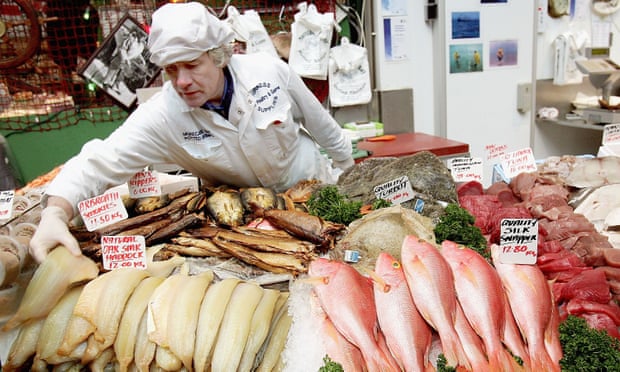
source: www.theguardian.com
Ok, so we know there is a problem with the way we fish. But the question is why? And why now? People have been fishing in one way or another almost as long as people have been around, so how is it we’ve managed to completely throw off the balance of the ocean so recently? In Paul Greenberg’s TED Talk, The Four Fish We’re Overeating and What to Eat Instead, he helps answer these questions. Greenberg is the author of the New York Times bestseller Four Fish, which has won the James Beard Award, and he writes regularly for The New York Times. His work has also been included in major publications like National Geographic Magazine, GQ, The Times (of London) and Vogue. He cites our unsustainable attitudes as consumers of fish as the major issue.
As a society we’ve completely narrowed down the natural environment to not see a whole ocean of edible fish, but instead just four: shrimp, tuna, salmon, and cod. That’s not to say you won’t eat any other fish, but it’s very rare that you will see something like carp on the menu at a restaurant. As consumers we’ve done this with more than just fish; red meats and poultry have been narrowed down into the main groups of four as well. At first glance, this doesn’t necessarily sound like a bad thing--certain fish just taste better right? Well the longterm effects are finally starting to become clear, and at the rate we’re eating our four favorites, the oceans will not be able to sustain our habits for much longer. They way we eat has led directly to the extreme overfishing of these four species, and a lot of environmentally degrading methods of catch followed to maximize supply.
Our love of these four fish has severely damaged the populations because we take “between 80 and 90 million metric tons out of the sea every year. That’s the equivalent of human weight of China”, which has put each of our key species on the path to extinction. But it also, increases the risk for other species, too. Fishermen have been turning to more careless methods of fish harvesting in order to keep up with demand and that leaves us with staggering statistics like the “15 pounds of fish that are regularly killed to bring 1 pound of shrimp to market”. Just by broadening our diets, as consumers, we can help save the four key species and dramatically decrease the amount of bycatch wasted.
In my future posts, I plan to address the most damaging fishing methods and some more sustainable methods we can replace them with.